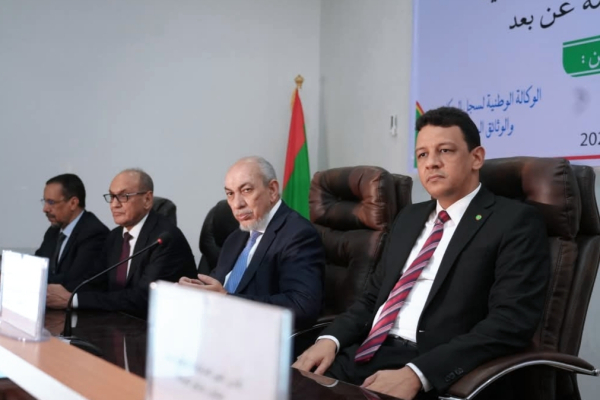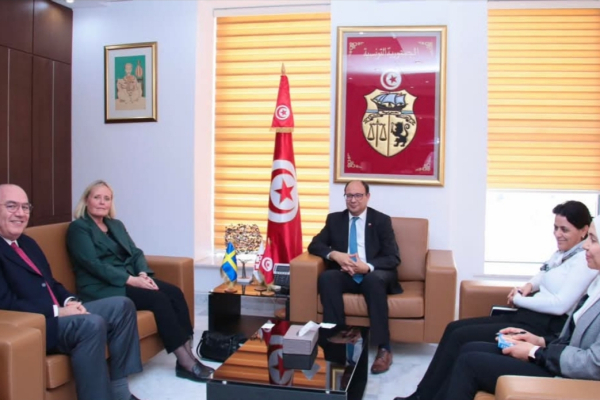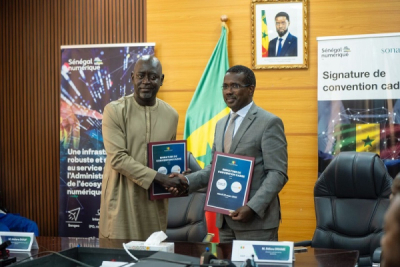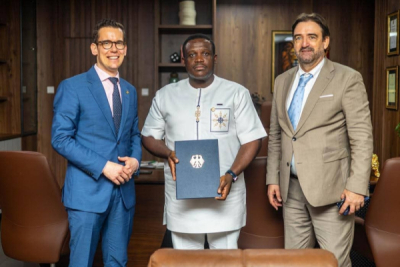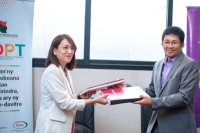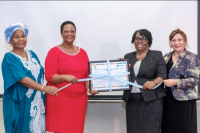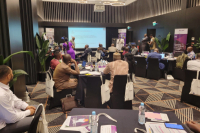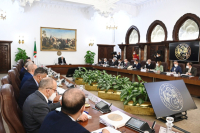
Public Management (479)
• Mauritania launches online criminal record service to simplify administration
• Citizens can access the service via Houwiyeti app and Khidmati portal, available on major app stores
• Government aims to improve transparency and efficiency in judicial processes
Mauritanian citizens can now obtain criminal records online, the government announced Friday, March 28, digitizing the process to streamline administrative procedures, expedite processing, and enhance judicial transparency.
The Ministry of Digital Transformation and Administrative Modernization stated that the service is accessible through the Houwiyeti app and the Khidmati portal, both available on the Play Store and App Store. "The Khidmati portal enables citizens to securely access digitized public services and complete procedures online from any smartphone or computer available in the Mauritanian market," the ministry said.
This initiative aligns with the government's goal of bringing public administration closer to citizens through digital transformation. On March 27, the ministry launched a digital platform to facilitate the creation and management of political parties. The previous day, authorities engaged with insurance sector stakeholders to integrate their services into the developing national digital services platform.
To support this digital push, the government launched the "Digital-Y" project in January, a 4 million euro (approximately $4.3 million) initiative in partnership with German cooperation. The project aims to integrate digital tools into public administration to modernize services, bolster transparency, and stimulate economic and social development.
However, the government's ambition faces potential challenges, including a lack of digital literacy and limited internet and device access. The International Telecommunication Union (ITU) estimates that approximately 55.6% of Mauritania's 5 million citizens did not use the internet in 2023.
By Isaac K. Kassouwi,
Editing by Sèna D. B. de Sodji
- Tunisia and Sweden held ministerial meeting to explore digital sector cooperation
- Talks focused on telecom infrastructure, 5G, cybersecurity, and startup support
Tunisia wants to deepen its cooperation with Sweden in the digital sector. The topic was discussed on Wednesday, March 26, during a meeting between Sofiene Hemissi (photo, center), Minister of Communication Technologies, and Cécilia Wramsten Usher, Ambassador of the Kingdom of Sweden to Tunisia. She was accompanied by Nader Ben Ammar, Managing Director of Ericsson Tunisia.
Key areas of cooperation under discussion include the development of telecom infrastructure, cybersecurity, the advancement of 5G applications, and support for startups and entrepreneurship.
This potential partnership could support the government's ambition for digital transformation, which it has made a cornerstone of its socioeconomic development. In 2024, Tunisia ranked 87th globally according to the United Nations E-Government Development Index (EGDI). The country scored 0.6935 out of 1, outperforming both African and global averages, though it still needs to improve in areas such as online services and human capital.
In terms of cybersecurity, Tunisia was ranked in the third tier (Tier 3) out of five by the International Telecommunication Union (ITU). The country still has significant progress to make in organizational measures, capacity building, and cooperation.
Sweden, for its part, ranks 14th globally on the EGDI. In cybersecurity, the ITU considers the kingdom a model to follow. This means the country demonstrates “a strong commitment […] through coordinated, government-led actions that cover the assessment, establishment, and implementation of generally accepted cybersecurity measures.”
For now, discussions between the two parties are still in the early stages. The exact scope of the potential collaboration has not yet been defined, and no official agreement has been announced. The evolution of the talks will need to be monitored to learn more about future directions and possible implications.
By Isaac K. Kassouwi,
Editing by Sèna D. B. de Sodji
The Egyptian Space Agency (EgSA) and AQMAAR Space Technologies, an aviation and aerospace component manufacturer, have signed a cooperation protocol aimed at advancing satellite manufacturing in Egypt. The partnership, signed on March 24, will harness the agency’s infrastructure for satellite testing, operations, and frequency allocation, strengthening collaboration between research institutions and the private sector.
AQMAAR is spearheading the development of satellite swarms designed for IoT, communications, and Earth observation. The company’s business model adopts the use of CubeSats (a class of small satellites), offering lightweight, modular, and scalable solutions for scientific research, commercial applications, and planetary missions. Small satellites built to CubeSat specifications save significant resources, helping to eliminate barriers to space access and exploration.
According to the ‘Small Satellite Market Size, Share, Competitive Landscape and Trend Analysis Report’ by Allied Market Research, the global small satellite market was valued $3,251.9 million in 2020 and is projected to reach $13,711.7 million by 2030, registering a CAGR of 16.4%. Egypt, through AQMAAR’s private-sector involvement, is positioning itself to tap into this lucrative market by developing swarms of satellites for IoT, communications, and Earth observation applications.
The agreement is expected to accelerate Egypt’s space technology capabilities, open new opportunities for research and development, and contribute to the expansion of commercial satellite applications. As Egypt continues its ambitious space agenda, this collaboration marks a significant step towards enhancing national self-sufficiency in satellite production and boosting the country’s presence in the international space sector.
Hikmatu Bilali
Sonatel has been driving Senegal’s digital transformation for several years. Following a recent agreement between its foundation and the Ministry of National Education, the group is now partnering with another state institution.
Sénégal Numérique (SENUM SA) and Sonatel, the owner of telecom operator Orange, announced a partnership agreement on Tuesday, March 25, to support Senegal's digital transformation. The two entities will combine their resources and expertise to develop innovative digital services and improve connectivity nationwide.
"This collaboration aims to accelerate Senegal's digital transformation by focusing on four key areas: strengthening infrastructure for reliable connectivity, developing sovereign cloud and data center solutions, digitalizing public services, and supporting innovation and citizen training," the group stated.
According to details shared on national television (RTS), the agreement includes interconnecting the two entities’ submarine cables to enhance the resilience of digital infrastructure; reactivating the SENIX internet exchange point to improve data traffic management and bolster digital sovereignty; and interconnecting the Sénégal Services and Orange Digital Service hubs to improve access to both public and private digital services. It also includes the implementation of an e-certification system to ensure traceability and compliance in environmental initiatives.
The partnership is part of Senegal’s new digital strategy, which aims to modernize public administration, strengthen digital sovereignty, and promote digital inclusion. It seeks to address challenges related to connectivity and access to digital services, which are essential for economic and social development.
The success of the partnership will depend on the concrete implementation of the planned initiatives. Challenges remain, particularly regarding infrastructure, digital skills training, and network coverage in rural areas. Regulation and governance of this public-private partnership could also present issues.
In the long run, this collaboration could foster the emergence of a dynamic digital ecosystem in Senegal, attract investment, and boost the country’s competitiveness in the tech sector.
By Adoni Conrad Quenum,
Editing by Feriol Bewa
Digital payment systems increase transparency, reduce leakages, and provide real-time tracking, ensuring more tax revenue reaches the government. By digitizing tax payments, the collaboration modernizes government collections, improves efficiency, and builds taxpayer trust through greater transparency.
The Nigerian Federal Inland Revenue Service (FIRS) has partnered with African payments technology company Flutterwave to enable digital tax collections. This was announced on March 20. It makes Flutterwave one of the few fintechs modernizing government payments.
Olugbenga ‘GB’ Agboola, CEO of Flutterwave, stated: "We are committed to leveraging technology to drive efficiency and economic growth. By simplifying tax payments, we are digitizing government collections and supporting national development in line with our mission."
Through this integration, businesses and individuals across Nigeria can now pay taxes, levies, and other obligations via Flutterwave’s secure and seamless payment infrastructure. The system offers real-time tracking, diverse digital payment options, offline payment capabilities, and enhanced transparency, ensuring a faster and more accessible tax payment experience.
According to the Nigerian Bureau of Statistics, Nigeria's tax-to-GDP ratio stood at 10.86% as of 2021. The country’s fragmented tax system, which hinders revenue growth, is cited as one of the reasons for this low figure. By digitalizing payments and improving accessibility, the collaboration centralizes tax collection, reduces bottlenecks, encourages compliance, and helps boost government revenue.
This partnership aligns with FIRS’ modernization efforts, which include the adoption of technology for transparency and efficiency, offering Nigerians a streamlined way to fulfill their tax obligations.
Hikmatu Bilali
Digital transformation is one of the priorities of the Ghanaian authorities, who are relying on international cooperation to achieve their goals.
Ghana and Germany discussed strengthening their collaboration in the digital sector during a meeting between Minister of Communication, Digital Technologies, and Innovation, Samuel Nartey George, and a German delegation on March 17.
The talks centered on promoting research and development in digital technologies, supporting information and communication technology (ICT) startups and entrepreneurs in Ghana, and accelerating the adoption of digital solutions.
This collaboration aligns with Ghana's ongoing digital transformation efforts. In late November 2024, the government launched a digital economy policy to leverage technology for growth, improve public services, and ensure equitable access. In October, a $5 million fund was announced to support technological innovation.
Ghana scored 0.6316 on the 2024 E-Government Development Index, ranking 108th out of 193 countries. The country surpasses West African and African averages but remains below the global average. Further efforts are needed in human capital development and online services, where Ghana scored 0.5586 and 0.6084, respectively.
In cybersecurity, Ghana is considered a global model by the International Telecommunication Union (ITU) in its "Global Cybersecurity Index 2024," though further capacity building is needed.
Germany, a global leader in digital transformation, ranked 12th, scored 0.9382 on the E-Government Development Index, well above the global average of 0.6382. On the ICT Development Index, Germany scored 87.8 out of 100.
A joint study by the International Finance Corporation (IFC) and Google predicts Africa's digital economy will be worth $712 billion by 2050, accounting for 8.5% of the continent's GDP. In 2022, Ghana's ICT sector contributed 21 billion cedis ($1.36 billion) to GDP, representing approximately 4% of the economy, up from 4.4 billion cedis in 2016.
By Isaac K. Kassouwi,
Editing by Sèna D. B. de Sodji
Madagascar aims to accelerate its digital transformation, making it a key economic driver across all sectors, including healthcare.
The Malagasy government launched a hospital digitalization project, with the Ministry of Public Health and the Ministry of Digital Development, Posts, and Telecommunications (MDNPT) signing a partnership agreement on Friday, March 14.
The project aims to improve governance and transparency in public hospitals and increase access to healthcare.
"Several stages are planned in this project, but optimizing the patient journey and improving patient care have been identified as priorities, as they have a direct impact on the daily lives of the Malagasy population," the MDNPT said in a Facebook statement. Minister of Public Health Zely Arivelony Randriamanantany said digital tools and systems would improve patient management and financial transaction monitoring.
The initiative aligns with Madagascar's 2023-2028 Five-Year Strategic Digital Plan, which seeks to position the country as a key player in Africa's digital economy. In the healthcare sector, the government aims to invest in human capital, improve governance, increase access to care, and strengthen public confidence in the national health system.
The World Health Organization (WHO) said the program could enhance healthcare services and optimize decision-making through real-time data collection, storage, and analysis. In its 2024 report, "Health Data Digitalization in Africa: Unlocking the Potential," the WHO stated, "This data-driven approach helps healthcare professionals choose appropriate treatments and supports policymakers in developing impactful health policies."
By Isaac K. Kassouwi,
Editing by Sèna D. B. de Sodji
UNESCO has already supported the digitization of education in several African countries since 2015 through this program. These include Côte d'Ivoire, Senegal, and Ghana.
The Namibian government has partnered with the United Nations Educational, Scientific and Cultural Organization (UNESCO) to integrate digital technologies into the national education system, officials announced Wednesday.
The initiative, launched March 12, is part of the third phase of the "ICT Transforming Education in Africa – Phase III" program, initiated in 2015 by UNESCO in partnership with the Korean Funds-in-Trust (KFIT). The program aims to leverage information and communication technologies (ICT) for educational development in sub-Saharan Africa.
In Namibia, the National Institute for Educational Development (NIED) will implement the project. It includes the creation of a national digital platform with curriculum-aligned content, digital skills training for teachers and learners, and the development of a comprehensive policy on ICT use in education.
The Namibian government considers ICT a key driver for transforming education, as outlined in the 2023-2030 charter project stemming from the 2022 National Education Conference. A needs assessment conducted between June and August 2024 identified challenges including access to digital learning resources, teachers’ digital skills, and the regulatory framework governing ICT use in schools.
"[...]The dynamic nature of technology necessitates continuous adaptation and innovation. If we are to fully harness the potential of ICT fully for enhanced teaching and learning, we must build upon our achievements and address the existing gaps. This project presents us with a remarkable opportunity to further our efforts in the digital transformation of education," said Anna Nghipondoka, Minister of Education, Arts, and Culture.
The digitization of education depends on widespread internet access in schools and homes. According to the International Telecommunication Union (ITU), 62.2% of Namibia’s estimated 2.9 million population has internet access, and 63.2% of households are connected. However, the household figure may include households where only one member has a subscription, including mobile access.
By Isaac K. Kassouwi,
Editing by Sèna D. B. de Sodji
To accelerate its digital transformation, the Cameroonian government is actively seeking investment. A key initiative is the Digital Transformation Acceleration Project, launched in 2023 and supported by a $100 million World Bank grant.
The European Union has invested 1.93 million euros ($2.09 million) in 12 micro-projects in Cameroon over four years through the Promotion of Research, Innovation, and Digital Culture in Central Africa (PRICNAC) project, officials said during a workshop this week.
The project’s capitalization workshop, held in Douala from March 10 to 14, 2025, aimed to evaluate the initiative and develop a sustainability plan for future similar projects, according to Investir au Cameroun.
"This initiative aims to evaluate the project both quantitatively and qualitatively in order to develop a sustainability plan that will allow similar initiatives to endure," said Alain Kiyindou, Regional Director of the Agence Universitaire de la Francophonie (AUF) for Central Africa and the Great Lakes.
PRICNAC, which ran from January 2021 to January 2025, has an overall budget of approximately 5 million euros for 17 mini-projects across eight Central African countries. The project is funded 15% by the Organization of African, Caribbean, and Pacific States (OACPS) and 85% by the EU through the ACP Innovation Fund and its research and innovation program.
The project aims to strengthen research and innovation capacities in Central African countries, consolidate innovation ecosystems, and create synergies between entrepreneurship, digital technology, and innovation policies to promote sustainable development and reduce poverty.
Cameroon accounted for 70% of PRICNAC’s 17 mini-projects and absorbed 60.48% of its budget.
Among the funded projects is Synerime, led by Cameroonian engineer Flavien Kouatcha, which aims to create employment opportunities for young people by fostering collaboration between research ecosystems, innovation, and businesses.
Funded with 150,000 euros, Synerime was implemented in Congo, Cameroon, and Gabon. "We have trained young entrepreneurs and student innovators on how to register a patent, propose solutions to businesses, and draft contracts with private companies so that these companies can adopt their solutions," Kouatcha said.
Frédéric Nonos
To modernize its operations, the Algerian state has focused on rapid digitization. A fully digital tax system is being developed to simplify and enhance the security of tax processes.
Algerian President Abdelmadjid Tebboune has directed the rapid implementation of a project to digitally link national tax data with the country's central digital database, signaling a push to eliminate manual tax data management and enhance transparency.
The directive, issued during a Council of Ministers meeting on Sunday, March 9, underscores the government's commitment to modernizing its tax system, according to a statement released by the council.
"This directive aims to facilitate procedures for investors while ensuring transparency in tax collection, monitoring, and regularization through a fully digitized process," the statement reads.
The digital interconnection seeks to streamline tax procedures for taxpayers, particularly investors, by providing faster access to tax services. It also aims to strengthen transparency and traceability in tax transactions, reducing the risk of fraud, tax evasion, and non-compliance. The digitization is expected to optimize tax revenue collection and improve property valuation.
The project is part of a broader initiative to modernize Algeria's tax administration and digitize public services. Since early 2023, sectors including Customs and State Property have undergone digital transformations.
The tax administration has deployed digital platforms, such as "Djibayatic" and "Moussahamatic," across tax structures nationwide, enabling taxpayers to conduct online procedures, file declarations, and make digital payments.
However, full implementation requires interoperability between tax platforms and those of other government agencies and economic sectors. Nine key interfaces are to be established, including connections with the Ministry of the Interior, Customs, State Property, the National Trade Register Center (CNRC), and the Algerian Investment Promotion Agency (AAPI). These interconnections will refine taxpayer identification and simplify procedures.
The project aims to modernize the tax administration and optimize revenue collection. Success hinges on deploying infrastructure, training tax agents in digital tools, and educating taxpayers on the benefits of digital taxation.
Algeria's move reflects a commitment to building a modern, transparent, and efficient tax administration.
By Samira Njoya,
Editing by Sèna D. B. de Sodji
More...
Moroccan authorities are prioritizing the development of citizens' digital skills. As part of this effort, they signed an agreement in late February to establish a specialized coding school in the Fès-Meknès region.
The Moroccan government will train children in digital skills and artificial intelligence as part of a national strategy to enhance its digital workforce.
An agreement was signed for that purpose on Saturday, March 8, between several stakeholders, under the supervision of Amal El Fallah-Seghrouchni, the Minister Delegate in charge of Digital Transition and Administrative Reform.
The partnership also includes the Ministry of Youth, Culture and Communication, the Ministry of Economy and Finance, and Mohammed VI Polytechnic University.
"This national program aims to introduce children to digital technologies and artificial intelligence through training workshops while instilling in them a responsible and secure use of digital tools," the ministry said in a press release published on social media. "Adopting an inclusive approach, this initiative seeks to support young digital talents across the Kingdom to integrate them into the country's digital transformation dynamic."
The initiative aligns with Morocco's ambition to "develop a pool of high-quality digital talent," as outlined in the Digital Morocco 2030 strategy. The Kingdom also aims to move up the value chain and strengthen its position in the outsourcing and digital export sectors.
In late February, an agreement was signed to establish a specialized school for programming and coding in the Fès-Meknès region.
The program could prepare Moroccan children for a rapidly evolving job market driven by accelerated digital transformation. According to the World Bank estimates, by 2030, nearly 230 million jobs in Sub-Saharan Africa will require digital skills. While Morocco is not part of Sub-Saharan Africa, the projection underscores the strategic importance of digital skills training in supporting the digital transition of African countries.
By Isaac K. Kassouwi,
Editing by Sèna D. B. de Sodji
The work on the Chadian component of the Trans-Saharan Fiber Optic Backbone was launched in May 2023. The project, assigned to the CGPS/LORYNE consortium, was initially scheduled to last ten months.
The Chadian government is urging the companies involved to speed up work on the Chadian component of the DTS project while ensuring that the quality of the installations is not compromised. According to authorities, the infrastructure is significantly behind schedule, with only 32% of the work completed.
Boukar Michel, Minister of Telecommunications, assessed the progress of the project on Thursday, March 6, during a field visit. He was accompanied by his colleagues and officials from entities under his ministry's supervision, including the Agency for ICT Development (ADETIC) and the Regulatory Authority for Electronic Communications and Postal Services (ARCEP).
This call comes after an intervention by Boukar Michel in May 2024, when he expressed concern over the slow progress and announced that a “drastic decision” would be taken. During another visit in October, the minister, accompanied by representatives from the European Union (EU) and the African Development Bank (AfDB), acknowledged some progress, albeit moderate, while stating that the work would be completed by the end of 2024 or early 2025.
The Chadian component of the DTS is a key element of Chad’s digital connectivity strategy. Lacking direct access to the sea and submarine cables, the country relies on its neighbors, particularly Cameroon and Sudan, for its connection to the international Internet. This infrastructure is also expected to facilitate interconnection with countries such as Niger, Mali, Nigeria, Mauritania, and Algeria. Official discussions with Egypt were also initiated in December 2024, paving the way for further collaborations.
"For dynamic electronic communication, a highway is needed for digital data traffic, and today, the most suitable highway is fiber optics. This is why the government, with the support of its partners, is committed to developing information and communication technologies (ICTs),” the Ministry of Telecommunications stated in a press release published on its Facebook page.
By Isaac K. Kassouwi,
Editing by Sèna D. B. de Sodji
Nigerian authorities are leveraging digital technology to enhance public service quality, with a goal of digitizing 75% of those services by 2027.
The Nigerian government plans to streamline citizen access to public digital services with a newly unveiled digital public infrastructure framework. The framework, designed to support citizens throughout their lives, will create a platform ensuring interoperability across all public services.
"[The framework] will also ensure that technology applications in government are designed and operated without silos, while recognizing the responsibilities and mandates of various ministries, departments, and agencies of government across all tiers of government in Nigeria," said Bosun Tijani, Minister of Communications, Innovation, and Digital Economy, in a post on X, formerly Twitter, on Tuesday, March 4. He added that this integrated government approach will leverage private sector capabilities to develop services for the public.
This initiative is expected to accelerate Nigeria's digital transformation. According to the World Bank, digital public infrastructure (DPI), encompassing digital identity, digital payments, and data sharing, serves as an intermediary between physical infrastructure and sectoral applications. The World Bank believes countries with robust DPI can sustain public services, commerce, hospitals, schools, and other activities through online channels.
The framework's development aligns with the government's goal to digitize 75% of public services by 2027. Meanwhile, the United Nations ranked Nigeria 144th out of 193 countries in the 2024 e-Government Development Index (EGDI), with a score of 0.4815 out of 1. While Nigeria's score exceeds the West African average of 0.3957 and the African average of 0.4247, it remains below the global average. In the online services category, Nigeria scored 0.5372.
However, the Nigerian government has not yet specified a timeline for implementing the DPI framework. Its successful implementation will depend significantly on the country's existing digital infrastructure, including internet connectivity, devices, servers, data centers, cloud services, and routers. In the EGDI's "telecommunications infrastructure" component, Nigeria scored 0.4836 out of 1.
By Isaac K. Kassouwi,
Editing by Sèna D. B. de Sodji
In its bid to grow its digital sector, Tunisia, like other African nations, is pursuing international partnerships, recently strengthening ties with India and France.
Tunisia and Italy discussed enhancing their information and communication technology (ICT) cooperation during a meeting on Monday, March 3, between Tunisian Minister of Communication Technologies Sofiene Hemissi (photo, right) and Italian Ambassador to Tunisia Alessandro Prunas (photo, right).
During the discussions, both parties emphasized areas related to promoting innovation, supporting entrepreneurship, and developing startups.
This potential cooperation could bolster the Tunisian government's digital transformation ambitions, a key pillar of its socioeconomic development strategy. In 2024, Tunisia ranked 87th globally in the United Nations' E-Government Development Index (EGDI), with a score of 0.6935 out of 1, surpassing both African and global averages. In cybersecurity, Tunisia was classified in the third category out of five by the International Telecommunication Union (ITU). The country acknowledges the need for further efforts in organizational measures, capacity building, and cooperation.
Italy, meanwhile, is recognized as a leader in cybersecurity. According to the ITU, this reflects a strong commitment to cybersecurity through coordinated and government-led actions. This includes the assessment, establishment, and implementation of generally accepted cybersecurity measures across all five pillars or up to all indicators. Italy also has an EGDI of 0.8355 out of 1, ranking 51st globally.
The discussions are in their early stages. The exact scope of the potential collaboration remains undefined, and no official agreement has been announced. The progress of negotiations will be monitored to provide further insight into the direction and potential implications.
By Isaac K. Kassouwi,
Editing by Sèna D. B. de Sodji


